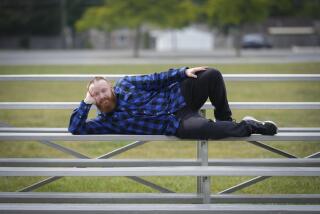A lost son finds his way home to Iraq
Two decades after Saddam Hussein’s regime terrorized the Kurdish city of Halabja with chemical weapons and tore his family apart, a 21-year-old man this week was reunited with his mother.
Ali Asmin’s long journey ended Thursday night when a judge revealed the results of DNA testing to the young man and six desperate families that had been hoping to find a son lost in the March 1988 attack that claimed as many as 5,000 lives.
“I wanted to return to . . . my birthplace,” Asmin said Friday. “All my family has been killed and my mother is alone.”
As he celebrated Friday at his mother’s home, Asmin clutched photos of family members who did not survive the ruthless military campaign against the Kurds in the late 1980s.
The operation called Anfal, or “Spoils of War,” saw villages razed and families sent to internment camps. As many as 182,000 people disappeared.
Asmin’s father and five siblings died when Hussein’s forces bombed Halabja, which had been captured by Kurdish rebels and Iranian soldiers toward the end of the 1980-88 Iran-Iraq war. Asmin, who was 4 months old at the time, was rescued by Iranian soldiers.
Back in Halabja, Asmin occasionally stared into space as relatives sang, overwhelmed by the knowledge that he would never meet his father, brothers and sisters. Only the night before he had learned his birth name, Zemenko Mohammed Ahmed, and he appeared to be still sorting out his feelings.
Asmin doesn’t speak Kurdish, only Persian. Neighbors acted as interpreters.
“I respect both my Kurdish and Persian families,” he said.
On the day the Iraqi army shelled Halabja, Asmin’s mother, Fatma Mohammed Saleh, had gone shopping with her six children. She remembered hearing, just before she passed out, one of her children cry, “Mom, I’m burning.”
The Iranian military evacuated the wounded, and Saleh awoke in a hospital in Tehran. Later, she handed out fliers and searched the Iranian capital for her children, but returned to Iraq alone.
What Saleh did not know was that Iranian soldiers had found the crying Asmin lying on the ground. The army planned to send him to an Iranian orphanage, but a female volunteer, Kubra Hamid Pur, adopted him. She named him Ali and raised him with her two sons in eastern Iran.
“My adoptive mother was nice with me,” he said. “She told me when I went to primary school that I am from Halabja and had been separated from my mother and father, and I needed to know who my family was.”
After his adoptive mother died three years ago, Asmin felt compelled to find his birth parents. He contacted the Iranian government for help.
“I felt lonely and a strange feeling called me to return to my original family and relatives,” he said.
But Asmin lacked identity papers. Three months ago, a chemical weapons expert who was a friend of Asmin’s Iranian relatives, met with Kurdish officials. He forwarded Asmin’s case to them.
At least 41 children had been listed as missing in the Halabja attack, and soon six families came forward claiming Asmin. Kurdish authorities decided to conduct DNA tests, and the results were announced Thursday night.
On Friday, Saleh, 58, hugged her son, a man with floppy black hair, dressed in traditional baggy Kurdish pants and a matching tunic. She laughed and squeezed him, coaxing a smile from her son.
“By God, these tears are of happiness!” she said, sobbing. “I can’t understand and realize what is happening! Am I dreaming? I never forget how I lost my entire family!”
Ahmed is a special correspondent. Times staff writers Ned Parker and Raheem Salman in Baghdad contributed to this report.
More to Read
Start your day right
Sign up for Essential California for news, features and recommendations from the L.A. Times and beyond in your inbox six days a week.
You may occasionally receive promotional content from the Los Angeles Times.






